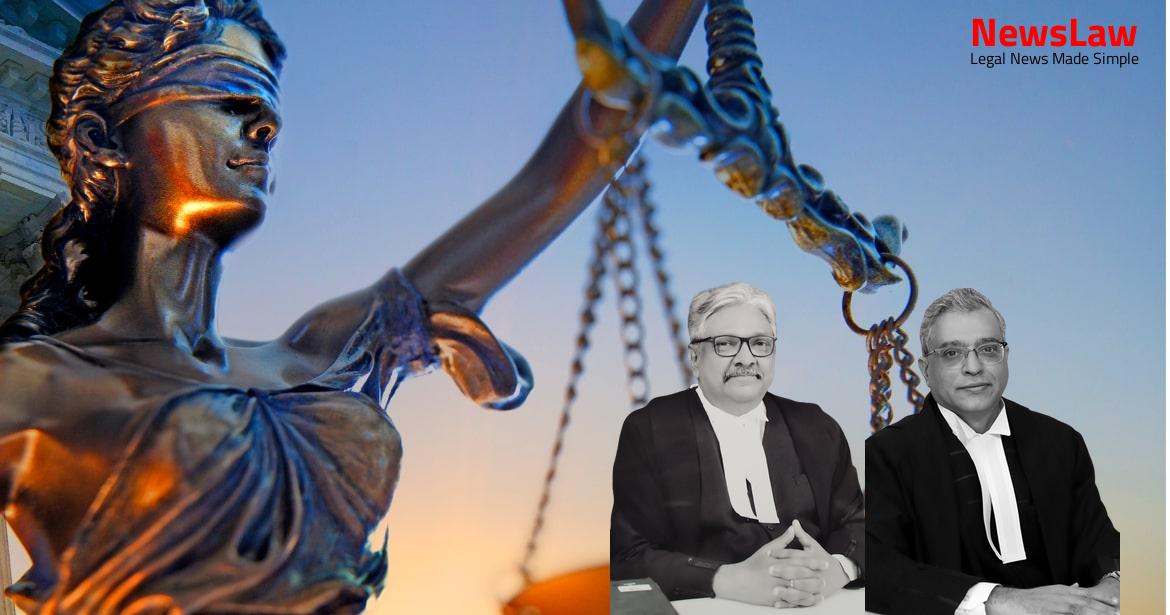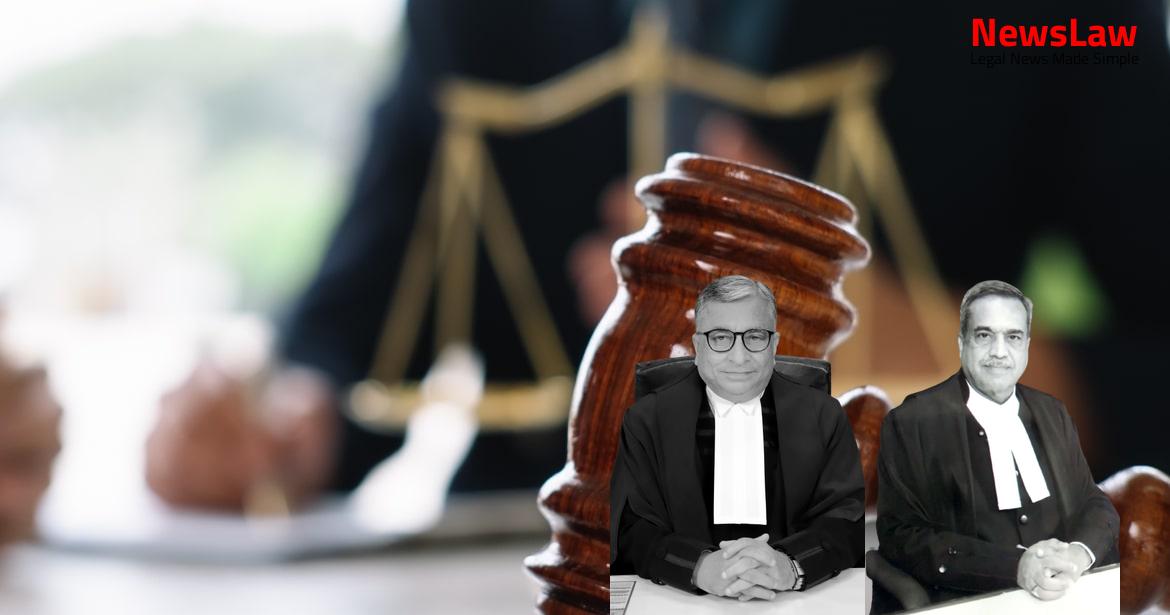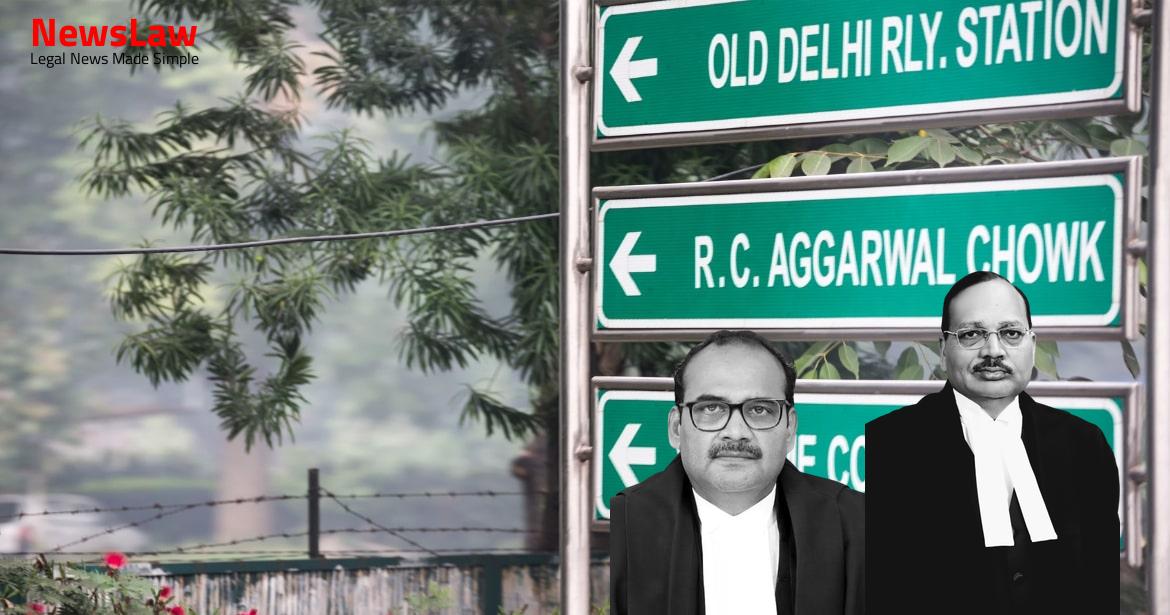Delve into the intricate legal analysis of how the court scrutinizes employer discretion in evaluating candidate suitability for public service appointments. Understanding the nuanced approach taken by the court in assessing factors such as background facts, nature of offenses, and fitness for the role offers insights into the judicial review process.
Facts
- The High Court allowed the writ petition filed by the first respondent against the decision of the appellant.
- The petitioner is instructed to file a representation along with the copy of the judgment passed in Avtar Singh’s case before the Registrar of the Rajasthan High Court.
- The representation should be decided in one month based on the adjudication in Avtar Singh’s case and the facts presented in the representation.
- The Lower Judiciary Committee of the appellant reevaluated the case of the first respondent based on specific FIRs and compromises mentioned.
- The committee considered the verification of antecedents as necessary to determine the candidate’s fitness.
- The High Court found that out of four cases against the petitioner, compromises were reached in two cases for simple matters and hence acquitted.
- The committee noted that the petitioner had four FIRs registered against him between 1999-2012, with serious nature offenses and non-clean acquittals.
- Despite acquittals in some cases, the committee deemed the offenses serious and the acquittals not clean, therefore the petitioner was not recommended for the post of Civil Judge Cadre.
- The committee emphasized that even if acquittal is recorded, relevant facts about the antecedents should be considered.
- Overall, the committee concluded that the first respondent did not deserve the appointment on the post of Civil Judge Cadre.
- The matter regarding the 12 candidates was referred back to the Committee by the 3 Chief Justices.
- A writ petition was filed by the 1 respondent based on the judgment of the Supreme Court in Avtar Singh vs Union of India & Ors.
- The High Court allowed the writ petition filed by the respondent.
- The Full Court accepted the decision of the High Court.
- The Committee did not recommend the case of the 1 respondent based on four criminal cases registered against Shri Morya.
- A communication was sent rejecting the representation of the respondent for the post of Civil Judge Cadre.
- The respondent applied pursuant to the rejection of the representation.
- The Committee again did not recommend the case of the 1 respondent based on compromise.
- The details of the criminal cases in which the respondent was involved and the outcomes were provided.
- The representation of the respondent was considered in light of the Supreme Court’s judgment in Avtar Singh’s case.
Also Read: Legal Analysis of Lease Deed Commencement Date
Arguments
- The appellant’s decision should not have been interfered with by the High Court as he was falsely implicated in the cases.
- The first respondent belongs to the Scheduled Caste community according to the petitioner’s counsel.
- The decision in Mohammed Imran has been noted and appreciated in a later judgment, Abhijit Singh Pawar.
- People at a young age may be more prone to mistakes, as highlighted by the petitioner’s counsel.
- If appointments are denied casually in such cases, trust in the judicial system will be affected.
- The employer has a duty to objectively assess the suitability of the candidate.
- The principle of reconsideration of decision in Mohammed Imran case should apply in this case as well, as argued by the petitioner’s counsel.
- The decision of the court in Mohd. Imran v. State of Maharashtra is not relevant to the respondent, as stated by the counsel.
- The liberal spirit in the Sandeep Kumar case should guide this Court, according to the petitioner’s counsel.
- The first FIR against the first respondent was related to a property dispute, as contended by the counsel.
- Ms. Meenakshi Arora, learned senior counsel for the appellant, argued that the High Court’s order was erroneous.
- The appellant emphasized the employer’s power to make decisions based on relevant inputs.
- The first respondent’s counsel mentioned a pending criminal case against the respondent in a similar case.
Also Read: Analysis of Jurisdiction and Exemption in ESI Act Case
Analysis
- Suitability is different from eligibility and allows for greater autonomy for the public employer as long as decision-making process is legal, fair, and in good faith.
- The verification of character and antecedents is important to ensure that suitable candidates are appointed.
- The cancellation of a candidate’s candidature must be based on valid reasons and not on past indiscretions that can be condoned, especially when the candidate was young.
- Public service roles require certain eligibility conditions, but the employer has discretion to overlook certain omissions or indiscretions.
- Individual cases like the one in Mohd. Imran v. State of Maharashtra are determined based on specific facts and previous court decisions.
- The line of decisions by the Supreme Court in cases like Commr. of Police v. Mehar Singh, State of M.P. v. Parvez Khan, and UT, Chandigarh Admn. v. Pradeep Kumar provide guidance on public service appointments.
- The employer has the power to appoint or terminate services based on various considerations.
- Involvement of the High Court in appointing judicial officers stems from the constitutional scheme.
- Judicial review ensures fair and reasonable application of norms.
- Employer can consider the impact of suppression or false information while adjudging suitability.
- Employer must consider the nature of the post and duties before making a decision.
- Alleged involvement in criminal cases may undermine public faith in the system.
- Acquittal should be honorable, not due to lack of evidence.
- Employers can prudently condone lapses based on the nature of the offense and conclusion.
- Employer’s decision should be based on nature of the offense, even if there is acquittal.
- Suppression or false information can affect fitness for appointment.
- Employer’s discretion is crucial in assessing candidate suitability based on antecedents.
- General acceptability of behavior involving petty crime or misdemeanors should be considered in certain cases.
- Employer has the right to assess background facts, nature of offense, and fitness even after an acquittal.
- Employer should not crush the future of a candidate based solely on past criminal cases.
- Each case should be scrutinized by the employer, especially in recruitment for law enforcement roles.
- The decision-making process should not be flawed.
- The Court will not interfere with the merits of the decision unless certain circumstances are present.
- The appellant’s decision, considering the Avatar Singh case and relevant principles, should not have been interfered with by the High Court.
- The connection between the timing of incidents, the candidate’s age, and the application timeline was noted.
- Based on the facts of the case, the High Court’s interference with the appellant’s decision was deemed unwarranted.
- The judgments in Mohammed Imran and Abhijit Singh Pawar were considered in evaluating the case.
- Factors such as the candidate’s age, the nature of the offenses, progression of FIRs to chargesheet, acquittal based on compromise, witness hostility, and the candidate’s suitability for the post were taken into account.
- The High Court should have approached the matter differently given these factors.
- In judicial review, the Court is not concerned with the decision itself.
Also Read: Legal Analysis of Toll Plaza Location Rule Violation
Decision
- The appeal has been allowed.
- The impugned judgment has been set aside.
- No specific orders have been issued regarding costs.
Case Title: RAJASTHAN HIGH COURT JODHPUR Vs. AKASHDEEP MORYA (2021 INSC 485)
Case Number: C.A. No.-005733-005733 / 2021



